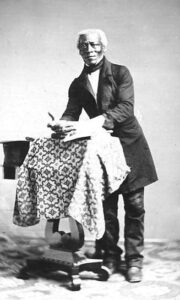People of Ontario County: Richard Valentine

Excerpt from Preston E Pierce’s A Tour Guide to Black History Sites in Canandaigua, NY.
Known for many years as a voice of conscience, Richard Valentine frequently made the Canandaigua community uncomfortable with his lectures on the subject of prejudice. Formerly enslaved, he was almost certainly a local conductor on the Underground Railroad.

Valentine was born in Maryland on a plantation owned by later Geneva resident, Daniel Dorsey. He was sold in Geneva to William DeZang, and by him to Judge Nathaniel W. Howell of Canandaigua. According to Valentine’s obituary in the Ontario County Times (Dec. 9, 1874, p. 3), “He was a bold, and from his boyhood, an open denouncer of slavery and slaveholders. He was an unruly slave… he could not be tamed and was set at liberty” when New York abolished slavery. He spent the next half century as a vocal opponent of slavery and prejudice. Illiterate throughout his life, Richard Valentine was nevertheless a learned orator and well-informed about issues of the day.
Richard Valentine was the eight child of Phebe, whose maiden name is unknown. His father, George Valentine, was Phebe’s third husband. His mother had 11 children. Canandaigua residents, Dennis White, Lloyd and Nancy Colbert were also half-siblings of Richard.
It appears that Richard Valentine spent a short time living in Rochester, and then purchased property in Canandaigua as early as 1828. His wife, Diadema, was listed in some records as part Native American. In later years, Richard Valentine owned land in South Bristol and Bristol.
In a manuscript autobiography written about 1907, Frances (Worden) Chesebro told how she gave supplies and assistance to Richard Valentine when he was helping “freedom seekers” on the Underground Railroad.
A niece of Mrs. William H. Seward, Frances Worden married her father’s law partner, Henry O. Chesebro. They lived on Chesebro Street (now Coy Street) in Canandaigua for many years. In her autobiography, Mrs. Worden also said that she had Richard Valentine buried here in her cemetery plot when he died.
Valentine is now “famous” in local folklore as the ghost of the Ontario County Courthouse where he lost a civil case that cost him much of his land. For some time he lived on Brook Street, near to the present St. Mary’s Church. His “haunting” of the Courthouse has been the subject of newspaper articles since 1887.
The multiple sales of Richard Valentine and his family, together with their move into a “free state” (as well as their subsequent experiences), illustrate the tragedy and chaos of the slave system, even in a northern state.
